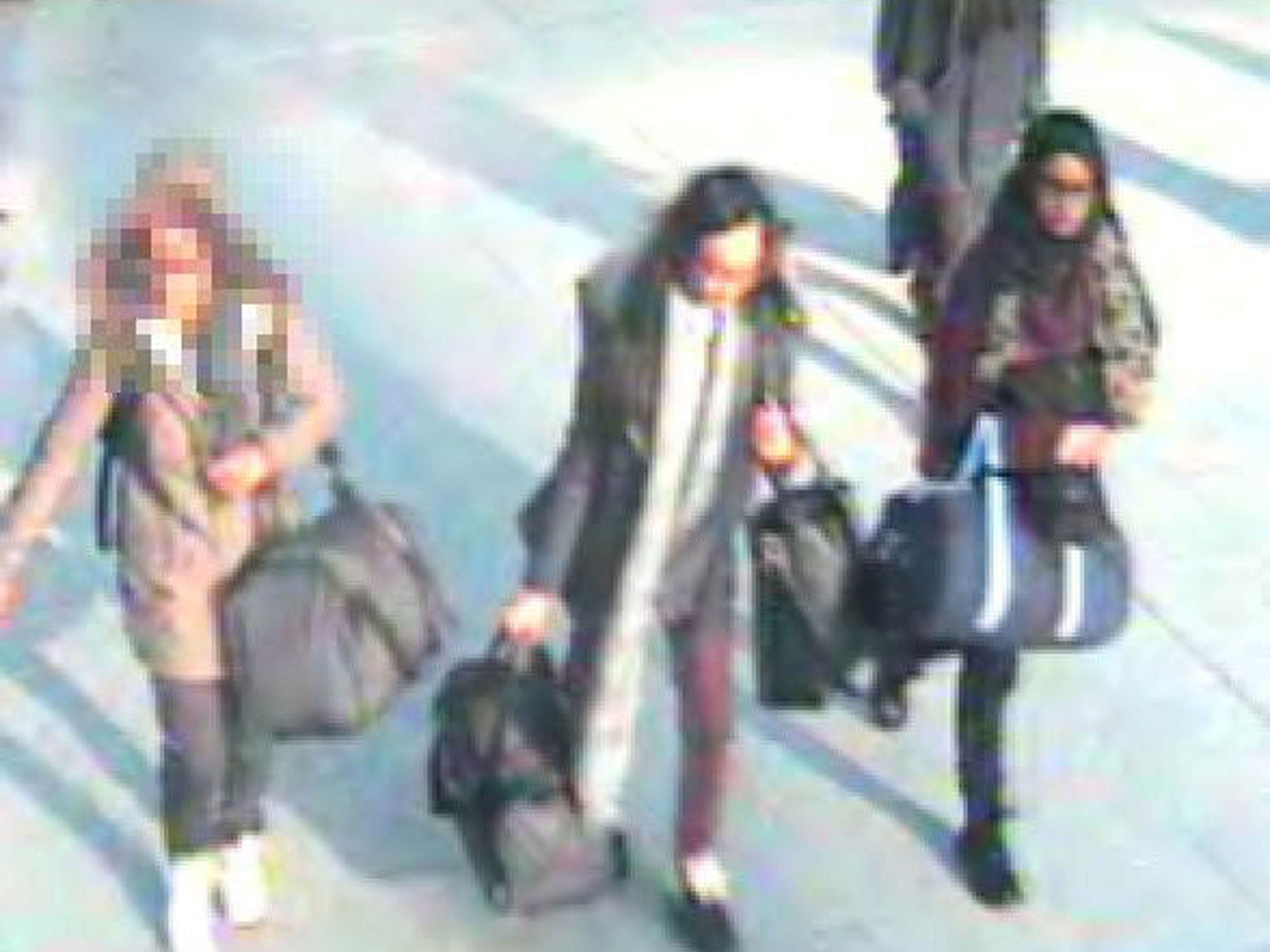Shamima Begum: Isis member loses Supreme Court battle to return to UK
Judges say right to a fair appeal over citizenship ‘does not trump all other considerations, such as the safety of the public’
Your support helps us to tell the story
From reproductive rights to climate change to Big Tech, The Independent is on the ground when the story is developing. Whether it's investigating the financials of Elon Musk's pro-Trump PAC or producing our latest documentary, 'The A Word', which shines a light on the American women fighting for reproductive rights, we know how important it is to parse out the facts from the messaging.
At such a critical moment in US history, we need reporters on the ground. Your donation allows us to keep sending journalists to speak to both sides of the story.
The Independent is trusted by Americans across the entire political spectrum. And unlike many other quality news outlets, we choose not to lock Americans out of our reporting and analysis with paywalls. We believe quality journalism should be available to everyone, paid for by those who can afford it.
Your support makes all the difference.Shamima Begum has lost her legal battle attempting to return to the UK to fight for her British citizenship.
The Supreme Court found that the former Isis member did not need to be in the country to have a “fair and effective appeal”, overturning a previous ruling by the Court of Appeal.
Begum left the UK for Syria aged 15, with two other schoolgirls from Bethnal Green in east London.
She was nine months pregnant when a journalist found her in the al-Hawl camp in northern Syria in early 2019, and her baby son later died.
Last July, the Court of Appeal ruled that she should be allowed to return to the UK to appeal against the removal of her British citizenship.
“Ms Begum should be allowed to come to the United Kingdom to pursue her appeal albeit subject to such controls as the secretary of state deems appropriate,” a summary of its decision said.
The Home Office immediately moved to appeal that judgment to the Supreme Court, staying its effects.
Lord Reed, the Supreme Court president, said the Court of Appeal had made four errors in its judgment, saying the right to a fair hearing “does not trump all other considerations, such as the safety of the public”.
Delivering the judgment on Friday, he said: “The Supreme Court unanimously allows the secretary of state’s [Priti Patel’s] appeals and dismisses Ms Begum’s cross appeal.
“The result is that Ms Begum’s appeal against the leave to enter decision is dismissed, her application for judicial review of the leave to enter decision is dismissed, and her application for judicial review of Special Immigration Appeals Commission’s preliminary determination in her appeal against the deprivation decision is dismissed.”
Begum, now 21, remains in a Syrian camp for women and children who were captured after leaving Isis territories.

The Syrian Democratic Forces, which runs the camp and other prisons, has repeatedly asked the UK and other countries to repatriate their nationals.
But the British government has been depriving surviving Isis members of their UK citizenship in a bid to stop them returning.
Maya Foa, director of the Reprieve legal charity, said the continued detention of Begum and others from the UK in Syrian camps was “untenable”.
She called for the government to repatriate detainees and prosecute the adults, while rehabilitating their children.
“The Supreme Court ruling has put the problem back in the hands of the government and it has always been their problem to resolve,” Ms Foa told The Independent.
“Indefinite detention without charge or trial, in unstable camps, is not a good situation from a justice perspective or a human rights perspective.”
She said Isis detainees had been left in a “legal black hole”, and that there were concerns that the possibility of them escaping, being freed or radicalising each other created other national security risks.
“If we are purely talking about what will keep the British people safe, it is not the ‘do nothing’ approach,” Ms Foa added.
Several MPs have called for Begum and others like her to be returned to Britain to face justice.
Tory MP and former Brexit Secretary David Davis called the Supreme Court ruling “disappointing” and wrote: “Regardless of what individuals like Shamima Begum have done, the UK cannot simply wash our hands of Brits in the Syrian camps.
“The correct approach would be to return them to the UK to answer for their crimes.“
Lord Reed, giving the Supreme Court judgment on behalf of all five justices, said the consequences of citizenship deprivation were serious.
“Although [Begum] cannot be rendered stateless, the loss of her British citizenship may nevertheless have a profound effect upon her life, especially where her alternative [Bangladeshi] nationality is one with which she has little real connection,” he added.
“But the setting aside of the decision may also have serious consequences for the public interest. In such a case, it would be irresponsible for the court to allow the appeal without any regard to the interests of national security which prompted the decision in question, and it is difficult to conceive that the law would require it to do so.”
Arguing their case at the Supreme Court in November, lawyers representing Begum said the government could not “assume” she would pose a terror threat if allowed to return to Britain.
Lord Pannick QC said safeguarding mechanisms had “failed” before Begum left the UK with two school friends in 2015, and that her “particular circumstances” should be taken into account.
But a barrister representing the home secretary said Begum had “aligned herself with Isis” and that her return to Britain would “expose the public to an increased risk of terrorism”.
Sir James Eadie QC drew judges’ attention to passages of an interview with The Times in which Begum said she did not regret travelling to Syria, and that seeing severed heads in a bin “didn’t faze me at all”.
The Supreme Court ruled there was “no basis for the Court of Appeal's finding that the national security concerns about Begum could be addressed and managed by her being prosecuted or subjected to Terrorism Prevention and Investigation Measures (TPIM) on her return.
Lord Reed said: “There was no evidence before the court from the police, the Crown Prosecution Service or the Director of Public Prosecutions as to whether it was either possible or appropriate to ensure that Ms Begum was arrested on her return and charged with an offence.
“Nor was it known whether, if she were arrested and charged, she would be remanded in custody: that would be a matter for the courts.”
The judge also said there was “no evidence, nor any submissions, before the Court of Appeal as to whether or not a TPIM could or would be imposed on Ms Begum, or as to the effectiveness of any such measure in addressing the risk which she might pose”.
Ms Patel, the home secretary, said: “The Supreme Court has unanimously found in favour of the government’s position, and reaffirmed the home secretary’s authority to make vital national security decisions.
“The government will always take the strongest possible action to protect our national security and our priority remains maintaining the safety and security of our citizens.”
The UN special rapporteur on counterterrorism intervened in the case, as did the Liberty and Justice human rights groups.
Liberty lawyer Rosie Brighouse said: “If a government is allowed to wield extreme powers like banishment without the basic safeguards of a fair trial it sets an extremely dangerous precedent.
“The security services have safely managed the returns of hundreds of people from Syria, but the government has chosen to target Begum. This approach does not serve justice, it’s a cynical distraction from a failed counterterror strategy and another example of this government’s disregard for access to justice and the rule of law.”
Of about 900 people who left Britain to engage in the conflict in Syria and Iraq since 2014, around one-fifth have been killed and 40 per cent have returned.




Join our commenting forum
Join thought-provoking conversations, follow other Independent readers and see their replies
Comments